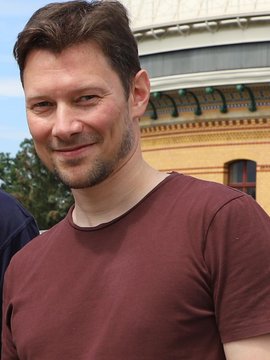Prof. Dr. Torsten Sachs

Building
A 70,
Room
303 (Büro)
Telegrafenberg
14473
Potsdam
Function and Responsibilities:
- Head of Earth-Atmosphere Interactions Group (TEAM)
- Speaker of TERENO Observatory Northeast German Lowlands
- GFZ representative in the MOSES Scientific Steering Committee
- GFZ representative in the German Arctic Dialogue with Federal Ministries and Agencies
Research Interests:
With my group I investigate processes and drivers underlying (changes in) the geosphere-atmosphere exchange of heat, water vapor, and carbon on a range of temporal (hourly to multi-annual) and spatial (local to continental) scales. We do so by combining ground-based and airborne micro-meteorological measurements, biogeochemical analyses, airborne and satellite remote sensing, numerical simulations, and machine learning methods. The current focus is on heavily disturbed and very dynamic peatland systems in NE Germany and pristine Arctic permafrost ecosystems with the aim to quantify changes in atmospheric composition and radiative forcing resulting from Earth surface processes.Career:
- 2016-2021 Assistant Professor of Atmospheric Physics
Technische Universität Braunschweig
- since 2012 Group Leader
Helmholtz Young Investigators Group "TEAM"
GFZ German Research Centre for Geoscience, Potsdam, Germany
- 2009-2011 Research Scientist / Postdoc
GFZ German Research Centre for Geosciences, Potsdam, Germany
- 2008 Visiting Scientist
ETH Zurich, Switzerland (DAAD Scholarship, ETH funding)
- 2005-2009 Research Scientist / PhD Student
Alfred Wegener Institute for Polar- and Marine Research, Potsdam
- 2004 Staff member
Barrow Arctic Science Consortium, Barrow, AK (Fulbright Scholarship)
Education:
- 2005-2009 PhD Geosciences
Alfred Wegener Institute for Polar- and Marine Research & University of Potsdam
Guest researcher at ETH Zurich (DAAD scholarship & ETH funding)
- 2002-2003 Master of Science in Environmental Science
Alaska Pacific University Anchorage, Alaska, USA (Fulbright Scholarship)
- 1998-2002 Undergraduate and graduate studies of Geoecology
Technische Universität Braunschweig, Germany
Projects:
- Funding by Federal Ministries:
- 2023 - 2032 (BMEL): WetNetBB - Management and biomass utilization of wet fens: Network of model and demonstration projects in peatland regions of Brandenburg - Subproject 5: GHG flux monitoring with eddy covariance
- 2022 - 2025 (BMBF): MOMENT - Permafrost Research Towards Integrated Observation and Modelling of the Methane Budget of Ecosystems - GFZ Subproject: The role of microbiology and water bodies for the methane budget of permafrost regions
- EU funding: Horizon Europe Research & Innovation Action:
- 2022 - 2026: WET HORIZONS - Upgrading knowledge and solutions to fast-track wetland restoration across Europe
- 2022 - 2024: AMPAC-Net - Arctic Methane and Permafrost Challenge Networking Action
- Finished projects:
- 2016 - 2022: INTAROS - Integrated Arctic Observing System
- 2017 - 2023: NUNATARYUK - Permafrost thaw and the changing Arctic coast
- 2017 - 2021: GHG-Manage - Managing and reporting of GHG emissions and C sequestration (Network: ERA-GAS)
- 2017 - 2021: iCUPE - Integrative and Comprehensive Understanding on Polar Environments (Network: ERA-PLANET)
Horizon 2020 Research & Innovation Action:
- DFG funding (German Science Foundation): International Research Training Group (GRK 2309/0):
- 2018 - 2023: TransTiP - Geo-ecosystems in transition on the Tibetan Plateau
- 2022 - 2025: MICHAEL - Methane fluxes and isotopic composition over heterogeneous landscapes of Arctic permafrost and Siberian peatlands
- 2019 - 2023: ALEXIA - Analysis Linking Arctic Methan, Carbon Release, Heat Fluxes and Sea Ice from Local to Sub-Regional Scales by Airborne Measurements
- Helmholtz Association funding:
MOSES - Modular Observation Solutions for Earth Systems
TERENO - Terrestrial Environmental Observatories Network
REKLIM - Helmholtz Network "Regional Climate Change"
HICAM - Helmholtz Climate Initiative
- Finished projects:
- 2012 - 2017: TEAM - Trace Gas Exchange in the Earth Atmosphere System on Multiple Scales
- 2014 - 2016: Capturing the hotspots – GHG dynamics during peatland restoration
Helmholtz Young Investigators Group:
Research Boards and Committees:
- since 2020 Steering Committee
Modular Observation Solutions for Earth Systems (MOSES)
- since 2019 Speaker
TERENO Observatory Northeastern German Lowlands
- since 2017 Working Group Leader
WG Permafrost, Modular Observation Solutions for Earth Systems (MOSES)
- since 2015 Science Team Member
NASA Arctic Boreal Vulnerability Experiment (ABoVE)
- since 2015 Observer, Science Advisory Group
German-French MERLIN Mission (Methane Remote Sensing LIDAR Mission)
- since 2013 Steering Group
GFZ Research Program "Geosystem: The Changing Earth"
Topic 3: Earth Surface and Climate Interactions
- 2012 - 2022 Topic Speaker
Helmholtz Network REKLIM (Regional Climate Change)
Topic 3: Regional Climate Change in the Arctic
- since 2012 Steering Group
TERENO Observatory Northeastern German Lowlands
- 2007-2010 Council Member
Association of Polar Early Career Scientists (APECS)
- 2007-2008 Co-Chair
Association of Polar Early Career Scientists (APECS) - Germany
- 2005-2007 Steering Committee
International Polar Year Youth Steering Committee (IPY YSC)
Awards:
- 2012 – 2017 Helmholtz Young Investigators Group
- 2008 German Academic Exchange Service (DAAD) Scholarship
- 2003 Alaska International Education Foundation (AIEF) Scholarship
Alaska Pacific University (APU) International Student Scholarship - 2002 – 2004 Fulbright Scholarship


